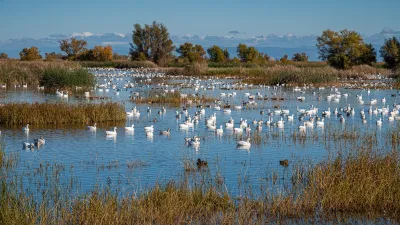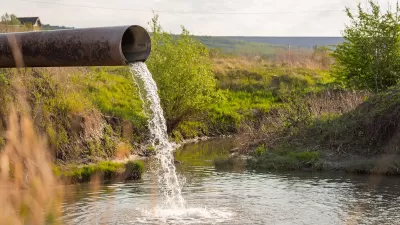Matt Pearce reports on the town of Marshall's road to recovery after a 2010 oil spill damaged the area's human and natural ecosystems, and describes how these long-term impacts should serve as a warning to other communities.
The Kalamazoo River in Michigan was reopened at the end of June after a massive 2-year clean-up of the oil spill that occurred during the summer of 2010, affecting both the river and the Talmadge Creek. A moratorium of a "do-not-eat" order for fish was also lifted, signaling what health officials hope to be a return to normalcy for the community.
While the Department of Health insists that the water is now safe, others are still wary. Rita Chapman, who deals with clean-water issues for the Sierra Club's Michigan chapter, warns, "They say that only 40 miles of the river was affected, but do we know that? The Kalamazoo flows roughly 80 miles to Lake Michigan, and Lake Michigan provides drinking water for millions of people."
Adding insult to injury is the realization of the increasing "corporate and regulatory failures" which make these kinds of spills possible. Writes Pearce, "Government investigators concluded that the pipeline's Canadian owner, Enbridge Inc., knew about the crack that led to the spill five years before the accident. They also found that when the break did occur, employees mistakenly continued to pump oil into parts of southern Michigan."
Community members and visitors have begun making their way back to the water in time for summer, while others remain fearful of the long-term impacts of these types of spills. Says local resident Susan Connolly, "I hope other communities will learn how we've been impacted here in Michigan. There will be other spills. It's not a matter of if, but when."
FULL STORY: Two years after oil spill, town and its creek are reshaped

Alabama: Trump Terminates Settlements for Black Communities Harmed By Raw Sewage
Trump deemed the landmark civil rights agreement “illegal DEI and environmental justice policy.”

Study: Maui’s Plan to Convert Vacation Rentals to Long-Term Housing Could Cause Nearly $1 Billion Economic Loss
The plan would reduce visitor accommodation by 25% resulting in 1,900 jobs lost.

Planetizen Federal Action Tracker
A weekly monitor of how Trump’s orders and actions are impacting planners and planning in America.

Wind Energy on the Rise Despite Federal Policy Reversal
The Trump administration is revoking federal support for renewable energy, but demand for new projects continues unabated.

Passengers Flock to Caltrain After Electrification
The new electric trains are running faster and more reliably, leading to strong ridership growth on the Bay Area rail system.

Texas Churches Rally Behind ‘Yes in God’s Back Yard’ Legislation
Religious leaders want the state to reduce zoning regulations to streamline leasing church-owned land to housing developers.
Urban Design for Planners 1: Software Tools
This six-course series explores essential urban design concepts using open source software and equips planners with the tools they need to participate fully in the urban design process.
Planning for Universal Design
Learn the tools for implementing Universal Design in planning regulations.
Caltrans
Smith Gee Studio
Institute for Housing and Urban Development Studies (IHS)
City of Grandview
Harvard GSD Executive Education
Toledo-Lucas County Plan Commissions
Salt Lake City
NYU Wagner Graduate School of Public Service




























